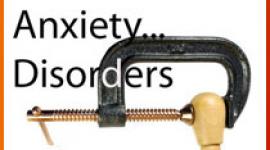Relaxation Therapy for Anxiety Disorders
Learn how to relax using these relaxation techniques.
 To overcome anxiety, phobias, or panic attacks it is of paramount importance to learn how to relax. It is impossible to feel relaxed and tense at the same time. People who live with high levels of anxiety often do not know how to relax or to release the tension stored in their muscles that is contributing to the experience of anxiety.
To overcome anxiety, phobias, or panic attacks it is of paramount importance to learn how to relax. It is impossible to feel relaxed and tense at the same time. People who live with high levels of anxiety often do not know how to relax or to release the tension stored in their muscles that is contributing to the experience of anxiety.
Regular, daily practice of relaxation techniques will assist you in relieving muscle tension, greatly improve your overall feeling of wellbeing and reduce your anxiety. Deep relaxation involves a number of physiological changes including:
- Decreases in heart rate
- Decrease in respiration rate
- Decrease in blood pressure
- Decreases in skeletal muscle tension
- Decrease in metabolic rate and oxygen consumption
- Decrease in analytical thinking
- Increase in skin resistance
Regular practice of deep relaxation for 20-30 minutes on a daily basis can produce, over time, a general feeling of relaxation and wellbeing that benefits every area of your life. When you feel relaxed and at ease you are less likely to turn on the anxiety response and will find that you feel more in control most of the time.
Other benefits of deep relaxation include:
- Reduction of generalized anxiety
- Reduction of frequency and severity of panic attacks
- Prevention of stress becoming cumulative
- Increased energy and productivity.
- Improved concentration and memory
- Increase in ability to focus
- Reduction of insomnia and fatigue
- Deeper and sounder sleep
- Prevention and or reduction of psychosomatic disorders such as hypertension, migraines, headaches, asthma, ulcers etc.
- Increased self confidence and reduced self blame
- Increased availability of feelings. Muscle tension is one of the chief impediments to an awareness of your feelings.
How do you achieve a state of deep relaxation?
- Correct abdominal breathing
- Progressive muscle relaxation techniques
- Meditation
Progressive Muscle Relaxation Technique
Progressive Muscle Relaxation is a technique for achieving a deep state of relaxation. Tensing a muscle and holding it for a few seconds, then releasing that tension will produce a deep sense of relaxation, and will rid the body of the built up tension from living with high levels of anxiety on a daily basis.
Guidelines
- Practice for at least 20 minutes per day
- Find a quiet location free from distraction
- Ensure the room temperature is comfortable - not too hot, and not too cold
- Practice at regular times - on awakening or before retiring or before meals
- Assume a comfortable position - your entire body needs to be supported
- Loosen any tight clothing and take off shoes
- Make a decision not to worry about anything - if you have any other thought come into your mind, just let them go and bring your attention back to your relaxation
- Assume a passive, detached attitude
Technique
Progressive muscle relaxation is a technique where you tense and relax one at a time, all the major muscle groups of the body. The idea is to tense each muscle group hard for about 10 seconds, and then to let go of it suddenly. You then give yourself 15-20 seconds to relax and become aware of the contrast between the feeling of relaxation to how it felt when tensed. You then move onto the next muscle group until you have worked your way through your whole body. Often it is helpful to have some quiet, gentle music in the background.
Reference
Bourne,E.J.,(1995) 'The Anxiety and Phobia Workbook - A step by step program for curing yourself of extreme anxiety, panic attacks and phobias', MJF Books, New York., p.65-76 passim).
next: Treatment of Phobias: Agoraphobia, Social Phobia, Specific Phobias
~ anxiety-panic library articles
~ all anxiety disorders articles
APA Reference
Tracy, N.
(2007, February 23). Relaxation Therapy for Anxiety Disorders, HealthyPlace. Retrieved
on 2026, March 4 from https://www.healthyplace.com/anxiety-panic/articles/relaxation-therapy-for-anxiety-disorders



